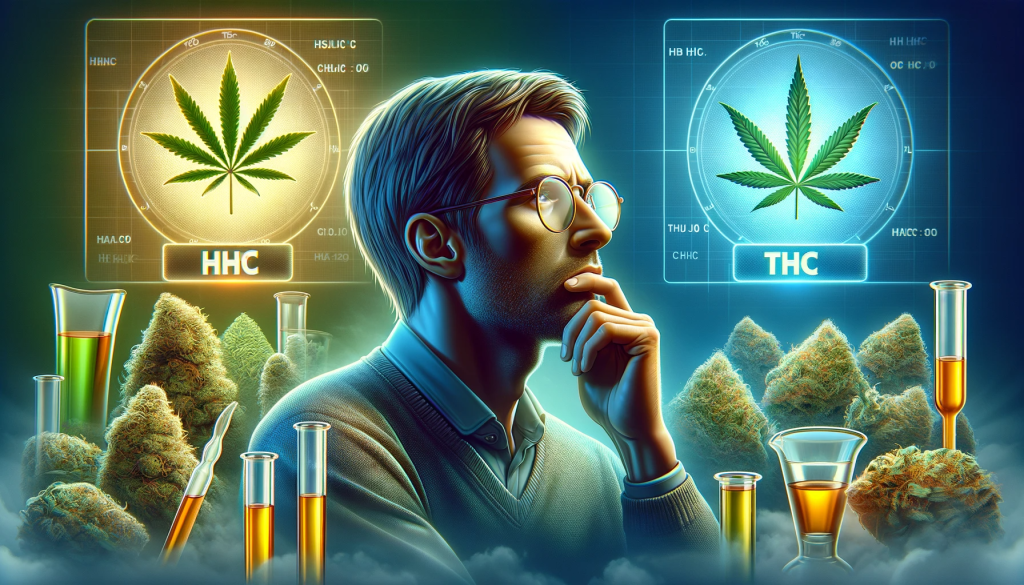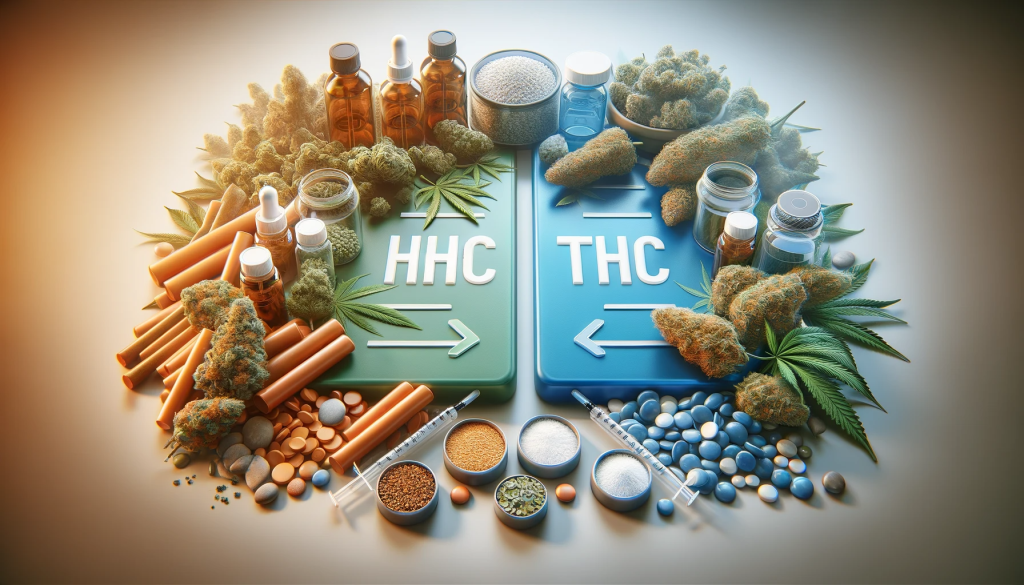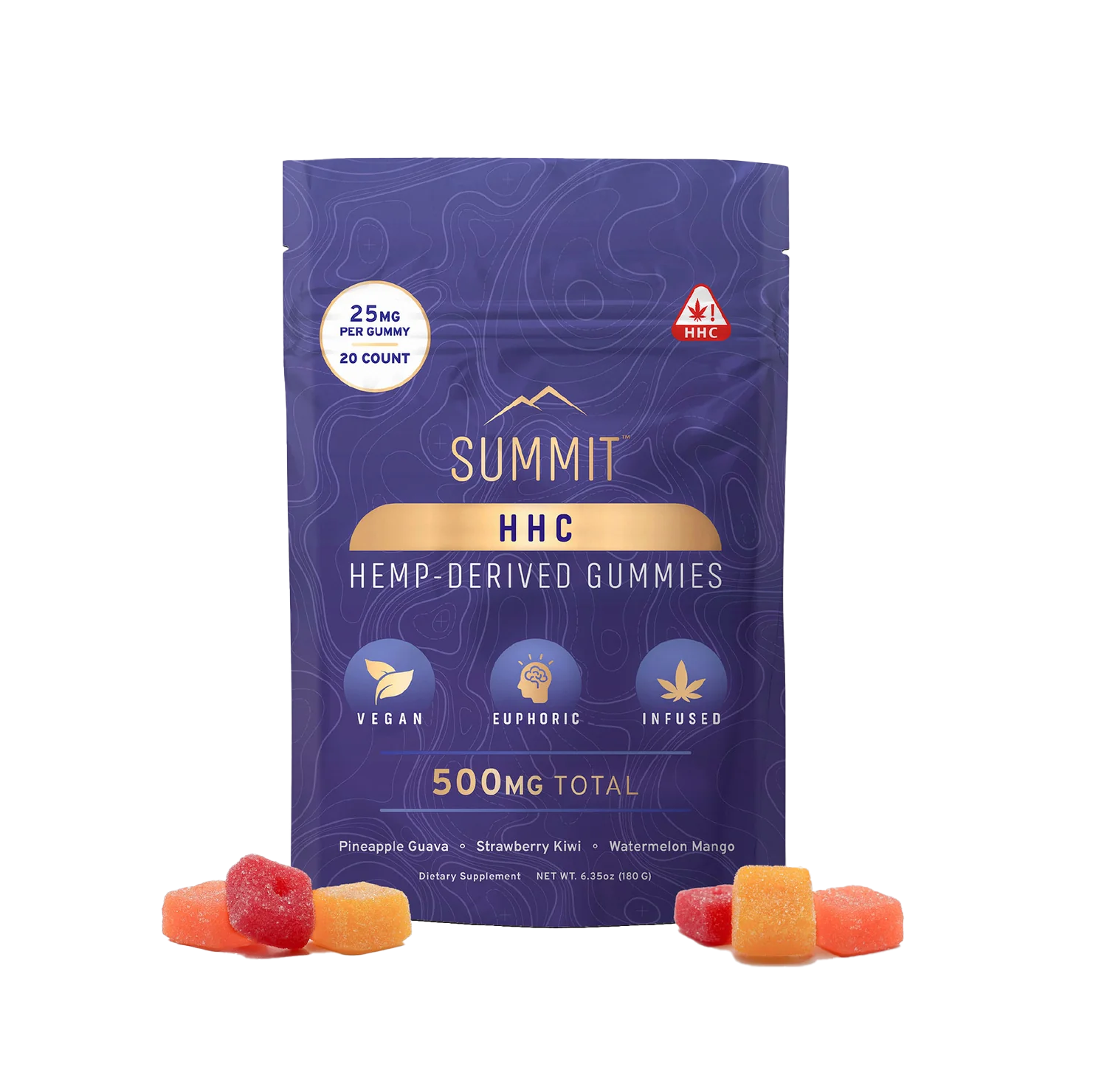Are you trying to understand the differences and similarities between HHC vs THC? If so, you’re not alone! We get it – figuring out all the ins and outs takes time. That’s why we’ve done in-depth research into this topic to provide a comprehensive guide on all aspects of HHC vs THC.
With this information and insight, potential THC or HHC users can make an informed decision for their healing process. Join us as we look at chemical structure, psychoactive effects, potential health benefits, and more.
Understanding HHC vs. THC

Learning the differences between THC and HHC begins with exploring their chemical structures and related properties.
Chemical structure and properties
THC and HHC have nearly identical molecular structures but slight differences that make a big difference in the overall effect on the body. Both are derived from the cannabis plant, and both contain hemp-derived cannabinoids. HHC is an analog of the THC molecule, with a similar but slightly altered chemical arrangement, specifically with a hexahydrocannabinol ring instead of a double bond in its cyclohexyl ring.
As such, it contains more hydrogen atoms than THC and the hydroxyl (OH) group. These molecular changes give them different properties. THC has a stronger psychoactive effect than HHC when ingested or smoked, while HHC may provide more sustained medical benefits.
Understanding their structural similarities and differences is key to understanding how they interact within the endocannabinoid system. If you’re opting for medical applications, you may desire higher levels of HHC and lower levels of THC. Recreational users typically opt for quite the opposite combination.
Similarities and differences
THC and HHC products are noted for their effects, ranging from relaxation and euphoria to pain relief. However, they’re not quite the same. Let’s explore their respective chemical structure properties and how they differ in their interactions with the body’s endocannabinoid system.
Both THC and HHC share a common ancestry in the cannabinoid family and are present in the cannabis plant. This means they both engage the endocannabinoid system, albeit in slightly different ways. THC acts on the CB1 receptors in the brain and has a notable psychoactive impact. HHC, on the other hand, offers a more subdued experience by comparison.
When choosing between HHC and THC, weigh factors like their availability and the kind of experience you’re seeking statuses. Your health profile and any potential risks or side effects you may have encountered from these and other cannabinoids should also be considered.
As we conclude, remember both THC and HHC can alter both perception and mood. While HHC offers a gentler nudge, THC packs a punch, leading to profound mind-altering experiences. So whether you’re looking for a calm evening or a deep dive into the recesses of your mind, there’s a cannabinoid for you. Just be mindful of the law and your well-being while you explore these compounds.
Interaction with the endocannabinoid system
We know that cannabinoids such as HHC and THC interact with the endocannabinoid system, a physiological system made up of molecules throughout the body. When these compounds bind to specific CB receptors in the endocannabinoid system, they can have neurochemical effects, which create changes in neurotransmission at various sites within the nervous system.
These interactions affect both synaptic transmission and direct modulation of neuronal activity independent from synapses. This means THC and HHC can directly influence electric signals without first interacting with other neurons or brain cells.
This has implications for psychoactive effects and potential medical benefits arising from different levels of cannabinoids interacting with specific CB receptors in unique ways. Ultimately, this could lead to different outcomes due to their interactions with the nervous system on multiple levels.
Effects and Benefits of HHC and THC

Both HHC and THC offer potential medical benefits, from pain relief to reduced inflammation. THC is induces psychoactive effects like euphoria. HHC does not have these same effects, which may make it a better choice for those who want therapeutic effects without the potent psychoactive effects.
Psychoactive effects of THC
THC is an active ingredient in cannabis (the hemp plant) that produces mind-altering effects, such as feelings of euphoria and altered perception. It affects people differently due to varying tolerance levels. Its effects are affected by dosage amount, the strain of cannabis consumed, and the mode of ingestion.
Common physical effects include increased appetite and a slower reaction time. As for mental health effects, THC products can lead to altered perception (e.g., sensory distortion), impaired memory formation and recall functions in short-term use, and mood changes (such as anxiety or paranoia) depending on the individual’s state before usage or their environment during use. It may also lead to cognitive impairment from extended exposure over long periods. Both recreational users who engage in frequent consumption of large amounts and medical patients taking prescribed doses for ailments are at risk when it comes to these adverse side effects.
THC products can also induce hallucinations if ingested in high amounts because they interact with different parts of the brain responsible for emotions and cognition processes like planning, actions, judgment, and decision-making. THC products also create positive sensations like increased pleasure, relaxation, and reduced inhibitions.
Potential medical benefits of HHC and THC
We have recently seen an increased interest in the potential benefits of HHC and THC. While both compounds can affect various bodily systems, their physiological activity varies significantly due to their different chemical structures and properties.
Research on cannabinoids is still evolving. However, scientists worldwide are studying both compounds’ therapeutic effects, and there has been some encouraging evidence so far.
THC produces euphoria along with its potential medicinal qualities, while HHC does not induce any psychoactive effects but may provide therapeutic benefits. Both substances interact with receptors in our endocannabinoid system to create a range of physical reactions in our bodies. Numerous studies link both cannabinoid compounds to diverse medical conditions such as chronic pain relief, inflammation reduction, reducing nausea or vomiting associated chemotherapy treatments, and seizure control for those suffering from epilepsy or autism spectrum disorder (ASD).
Choosing HHC or THC

Different factors such as availability and accessibility, personal preferences, potential risks, and side effects should all be considered before making a decision about which THC or HHC products to consume.
Factors to consider
When deciding THC or HHC, there are a few key factors to consider. Firstly, potency: while HHC is milder than traditional THC in terms of its psychoactive effect, it’s estimated to be around 80% as potent. It’s also important to look at the research available related to safety and efficacy for each cannabinoid. While research into HHC is still limited compared to other cannabinoids like CBD and THC. Additionally, one should take into account how intense an experience they desire. HHC gummies and other products tend to deliver a more clearheaded experience with less strong psychoactive effects than THC gummies or other products.
Availability and accessibility
Naturally occurring THC is widely available, with the most well-known source coming from marijuana plants. HHC products are not as readily available in their natural form and may be synthesized or extracted from various organic sources, including hemp, cannabis, and other sources.
There are a variety of factors that influence availability and accessibility largely based on legal regulations that vary by country or region. For example, although THC is completely illegal in some parts of the world, many countries recognize its medical value and have legalized it for certain uses, while others place strict regulations on its use according to government standards.
HHC contains very low amounts of THC (less than 0.3%, depending on concentration). So, the HHC legal status could vary or even be unrestricted, even in locations where THC remains prohibited entirely or only allowable under limited circumstances.
Personal preferences
When considering the choice between HHC and THC, it is important to factor in individual preferences. For instance, different people may have very different reasons for consuming cannabis products.
Some simply want a light overall experience, while others may be looking for more intense psychoactive effects. Thus, personal likes and dislikes dictate which product one can choose from.
In determining whether to opt for either HHC or THC, potential users should take into account their own tolerance levels and desired high. Different cannabis products offer vastly differing experiences depending on their unique chemical composition. This may be another point of consideration in making an informed decision regarding your HHC or THC consumption.
Potential risks and side effects
Using high-potency cannabinoids like HHC may carry potential risks and side effects, so users should be aware of the physical and mental health impact. Commonly reported side effects associated with delta-9 THC, such as dry mouth, red eyes, increased heart rate, anxiety, and paranoia (similar to side effects from smoking marijuana), have been observed in those using HHC products as well.
High-potency cannabinoids can also increase your risk of developing psychosis or conditions such as depression, anxiety, or schizophrenia. Other drawbacks include impaired memory and concentration, which could lead to further cognitive issues if abused.
It is important for people considering cannabinoid use — whether it be from medical cannabis or alternatives — to be aware of these potential risks before deciding while understanding that individual reactions may vary greatly depending on factors like drug tolerance levels and personal susceptibility.
Summit THC
<p>Lifting your mood and infusing your body with dreamy blissfulness, our HHC Gummies strike the perfect balance between Delta 8 and Delta 9.</p>
Shop Now
Conclusion
HHC and THC are both found in the cannabis plant, but they differ significantly in their effects, potency, and stability. HHC offers a milder “high” than THC and is more stable when stored over time.
The effects of HHC have been linked to feelings of relaxation, relief from discomfort, and mild euphoria compared to the intense psychoactive effects that accompany traditional THC.
It’s important to consider factors such as availability and accessibility, personal preferences, and potential risks associated with using either compound when choosing between them. For people looking for natural therapeutic options without an intense sense of euphoria or feeling “high,” HHC is a viable option because it delivers many of the same benefits as traditional marijuana without any serious side effects.
Ultimately, it comes down to individual preference. Whatever your decision may be, we hope you take comfort in knowing that safe alternatives are available.
FAQs
1. What is the difference between HHC and THC?
HHC (hemp-derived cannabidiol) is a type of cannabinoid found in hemp, while THC (tetrahydrocannabinol) is an active ingredient found in marijuana.
2. Why are HHC and THC important?
A TH and an HHC molecule will both interact with the body’s cannabinoid receptors to produce various effects on the mind and body, ranging from relaxation to pain relief.
3. Is one better than the other?
No, neither HHC nor THC can be described as “better” than the other as they provide different types of benefits depending on individual needs or preferences.
4. Are there any potential side effects when using either substance?
Yes, while rare, some users may experience negative side effects when using either HHC gummies or THC products, such as dizziness or headaches, so it’s important to always practice caution when consuming these substances.






